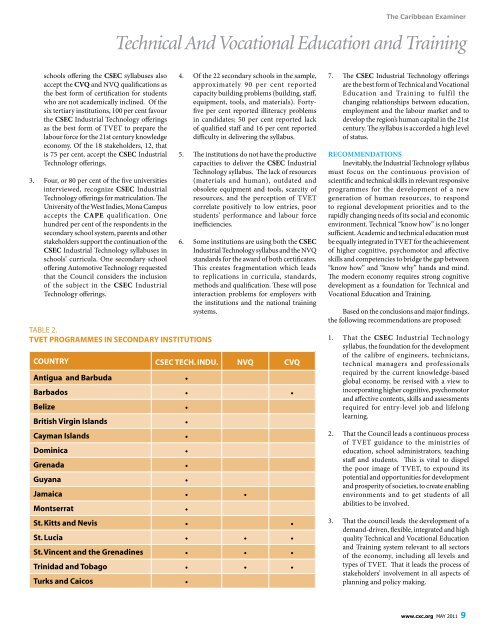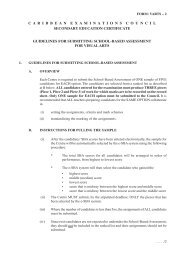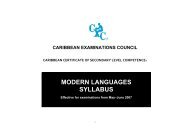The Caribbean Examiner ⢠Vol 9 ⢠No 1 ⢠May 2011
The Caribbean Examiner ⢠Vol 9 ⢠No 1 ⢠May 2011
The Caribbean Examiner ⢠Vol 9 ⢠No 1 ⢠May 2011
You also want an ePaper? Increase the reach of your titles
YUMPU automatically turns print PDFs into web optimized ePapers that Google loves.
<strong>The</strong> <strong>Caribbean</strong> <strong>Examiner</strong><br />
Technical And Vocational Education and Training<br />
schools offering the CSEC syllabuses also<br />
accept the CVQ and NVQ qualifications as<br />
the best form of certification for students<br />
who are not academically inclined. Of the<br />
six tertiary institutions, 100 per cent favour<br />
the CSEC Industrial Technology offerings<br />
as the best form of TVET to prepare the<br />
labour force for the 21st century knowledge<br />
economy. Of the 18 stakeholders, 12, that<br />
is 75 per cent, accept the CSEC Industrial<br />
Technology offerings.<br />
3. Four, or 80 per cent of the five universities<br />
interviewed, recognize CSEC Industrial<br />
Technology offerings for matriculation. <strong>The</strong><br />
University of the West Indies, Mona Campus<br />
accepts the CAPE qualification. One<br />
hundred per cent of the respondents in the<br />
secondary school system, parents and other<br />
stakeholders support the continuation of the<br />
CSEC Industrial Technology syllabuses in<br />
schools’ curricula. One secondary school<br />
offering Automotive Technology requested<br />
that the Council considers the inclusion<br />
of the subject in the CSEC Industrial<br />
Technology offerings.<br />
Table 2.<br />
TVET Programmes in Secondary Institutions<br />
4. Of the 22 secondary schools in the sample,<br />
approximately 90 per cent reported<br />
capacity building problems (building, staff,<br />
equipment, tools, and materials). Fortyfive<br />
per cent reported illiteracy problems<br />
in candidates; 50 per cent reported lack<br />
of qualified staff and 16 per cent reported<br />
difficulty in delivering the syllabus.<br />
5. <strong>The</strong> institutions do not have the productive<br />
capacities to deliver the CSEC Industrial<br />
Technology syllabus. <strong>The</strong> lack of resources<br />
(materials and human), outdated and<br />
obsolete equipment and tools, scarcity of<br />
resources, and the perception of TVET<br />
correlate positively to low entries, poor<br />
students’ performance and labour force<br />
inefficiencies.<br />
6. Some institutions are using both the CSEC<br />
Industrial Technology syllabus and the NVQ<br />
standards for the award of both certificates.<br />
This creates fragmentation which leads<br />
to replications in curricula, standards,<br />
methods and qualification. <strong>The</strong>se will pose<br />
interaction problems for employers with<br />
the institutions and the national training<br />
systems.<br />
COUNTRY CSEC TECH. INDU. NVQ CVQ<br />
Antigua and Barbuda<br />
Barbados • •<br />
Belize<br />
British Virgin Islands<br />
Cayman Islands<br />
Dominica<br />
Grenada<br />
Guyana<br />
•<br />
•<br />
•<br />
•<br />
•<br />
•<br />
•<br />
Jamaica • •<br />
Montserrat<br />
St. Kitts and Nevis • •<br />
St. Lucia • • •<br />
St. Vincent and the Grenadines • • •<br />
Trinidad and Tobago • • •<br />
Turks and Caicos<br />
•<br />
•<br />
7. <strong>The</strong> CSEC Industrial Technology offerings<br />
are the best form of Technical and Vocational<br />
Education and Training to fulfil the<br />
changing relationships between education,<br />
employment and the labour market and to<br />
develop the region’s human capital in the 21st<br />
century. <strong>The</strong> syllabus is accorded a high level<br />
of status.<br />
RECOMMENDATIONS<br />
Inevitably, the Industrial Technology syllabus<br />
must focus on the continuous provision of<br />
scientific and technical skills in relevant responsive<br />
programmes for the development of a new<br />
generation of human resources, to respond<br />
to regional development priorities and to the<br />
rapidly changing needs of its social and economic<br />
environment. Technical “know how” is no longer<br />
sufficient. Academic and technical education must<br />
be equally integrated in TVET for the achievement<br />
of higher cognitive, psychomotor and affective<br />
skills and competencies to bridge the gap between<br />
“know how” and “know why” hands and mind.<br />
<strong>The</strong> modern economy requires strong cognitive<br />
development as a foundation for Technical and<br />
Vocational Education and Training.<br />
Based on the conclusions and major findings,<br />
the following recommendations are proposed:<br />
1. That the CSEC Industrial Technology<br />
syllabus, the foundation for the development<br />
of the calibre of engineers, technicians,<br />
technical managers and professionals<br />
required by the current knowledge-based<br />
global economy, be revised with a view to<br />
incorporating higher cognitive, psychomotor<br />
and affective contents, skills and assessments<br />
required for entry-level job and lifelong<br />
learning.<br />
2. That the Council leads a continuous process<br />
of TVET guidance to the ministries of<br />
education, school administrators, teaching<br />
staff and students. This is vital to dispel<br />
the poor image of TVET, to expound its<br />
potential and opportunities for development<br />
and prosperity of societies, to create enabling<br />
environments and to get students of all<br />
abilities to be involved.<br />
3. That the council leads the development of a<br />
demand-driven, flexible, integrated and high<br />
quality Technical and Vocational Education<br />
and Training system relevant to all sectors<br />
of the economy, including all levels and<br />
types of TVET. That it leads the process of<br />
stakeholders’ involvement in all aspects of<br />
planning and policy making.<br />
www.cxc.org MAY <strong>2011</strong> 9

















